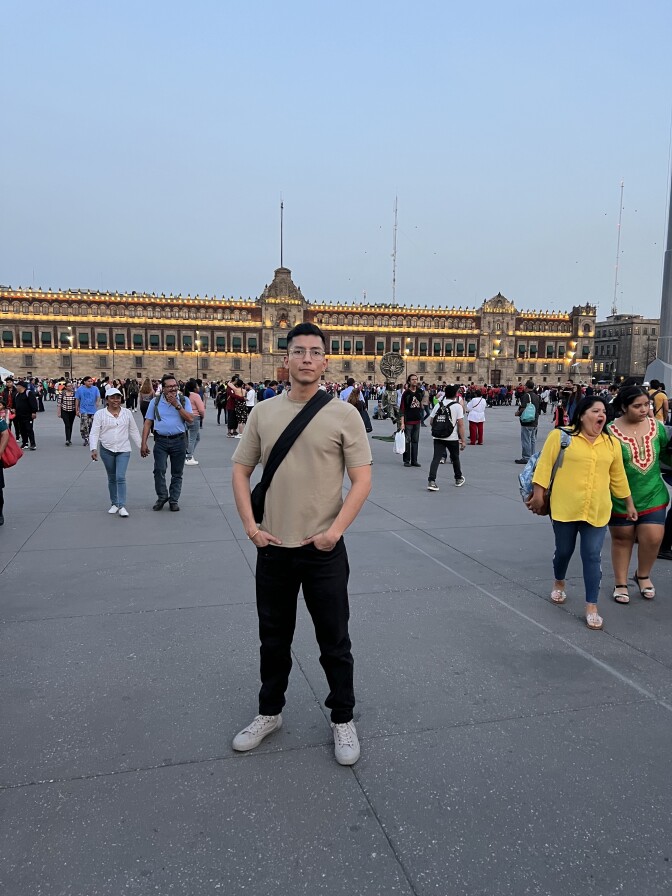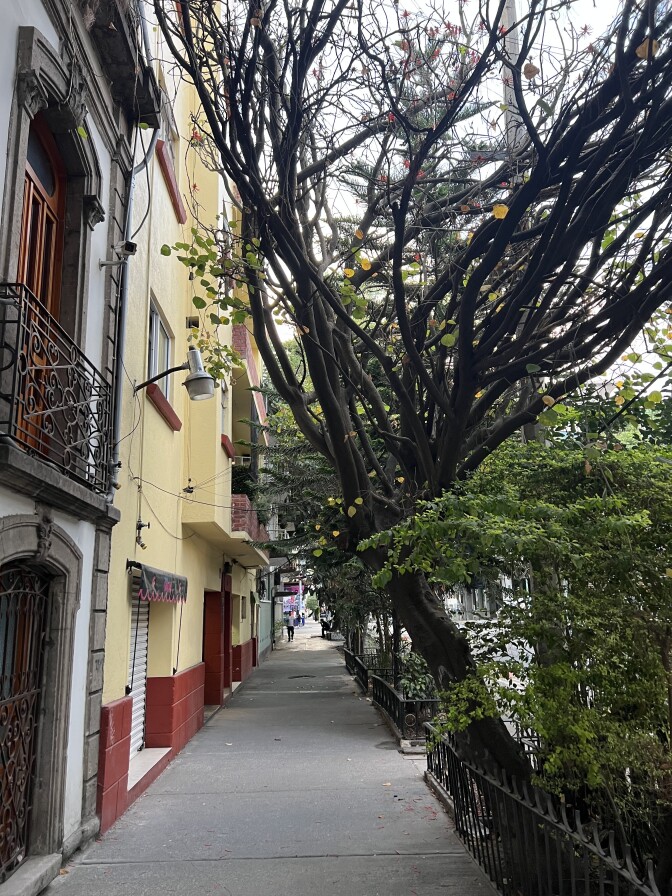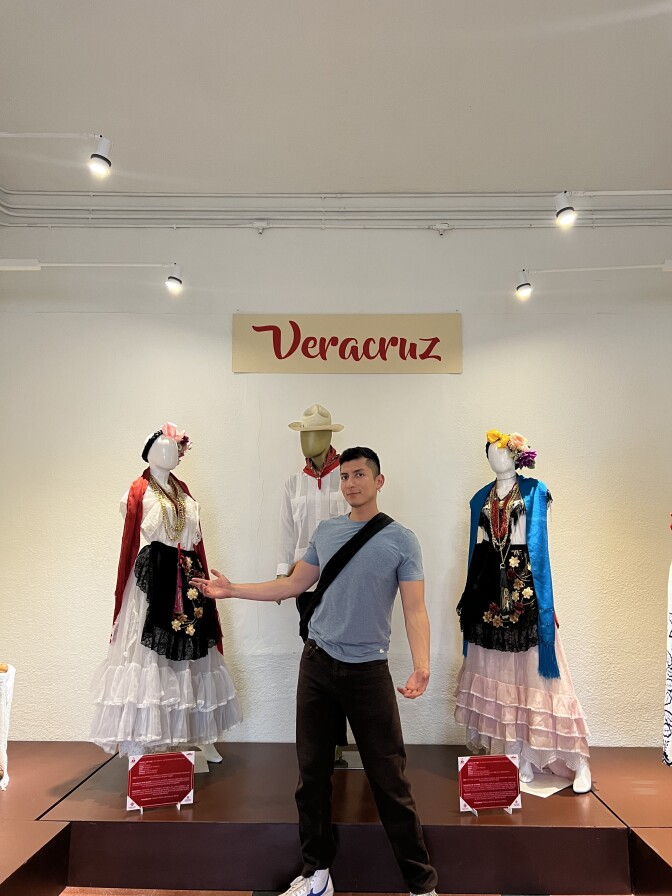This story is free to read because readers choose to support LAist. If you find value in independent local reporting, make a donation to power our newsroom today.
After My First Visit To Mexico, I’m Embracing Being Pocho

Ni de aquí, ni de allá.
Not from here or there.
It’s that feeling that many Mexicans and Mexican Americans living in between two worlds — or countries — often face. Sometimes our family tells us our broken Spanish gives pocho vibes, or our friends say our style isn’t American enough.
Immigrants (or children of immigrants) get what I’m saying.
My first trip back to Mexico as a DACA recipient wasn’t just about seeing my abuelas or going through the advance parole process to be able to come back into the United States. (I wrote about that immigration document in my previous essay: How — And Why — I Got Permission To Leave The US To Visit My Homeland Of Mexico After 30 Years.) I also wanted to understand more of my history and roots, as a Mexican living in the exterior.
Back in Mexico
The moment I realized I wasn’t in the U.S. anymore was shortly after my plane landed.
I looked at the airport officials in Puerto Vallarta — my first stop on my Mexico twirl — and many looked like me: tall, light brown, dark hair. Their Spanish was clear Mexican Spanish, not like my parents; which has been washed by living here for decades.
About How To LA
We’re here to help curious Angelenos connect with others, discover the new, navigate the confusing, and even drive some change along the way. Host Brian De Los Santos brings you stories about L.A., for L.A., by L.A. — with your help. Like you, we know this city is unique, and that’s why it’s one of the reasons we love it.
When I got to immigration, they put me in the line for Mexican citizens. The immigration official said “welcome back” in Spanish. I whizzed on by as Americans and other nationals were stuck in a line that snaked the lobby.
All of these emotional moments swelled up as I grabbed my luggage and headed outside to order my Uber. I felt like I was home in a way. But I was also scared of sticking out like a sore thumb.
‘One of us’
I’ve never claimed my “Americanness” because of my immigration status in the United States. It was almost like this badge of immigrant trauma that I explained to folks whenever they asked if I’m American. “I’m undocumented, I’m definitely not American.”
But that thought began to change as I spent more time with people in Mexico.
During one hangout with friends in Puerto Vallarta, my status and, more specifically, my culture came up.
“Pero tu eres Chicano,” my new friend Rafa told me. “You’re from California, you have that accent and you’re Mexican and American.”
I fiercely told him that didn’t apply to me and that Chicano was a term that someone had to self-identify with. I don’t identify as such. And I attempted to explain my immigration status, but they were all confused. “Soy indocumentado — un ‘dreamer,’” I told them. It finally clicked for them.
But I was still curious. Why was I Chicano to them when they barely knew my story?

Rafa later explained that many folks in Mexico see those Latinos who live in the United States as their own specific culture. It’s not the same if those same immigrants stayed living in Mexico. Chicano is an easy way to explain identity to someone — at least for him, he said.
I was almost like an outsider looking in. I was in their world. Is this culture shock?
At the end of our conversation, Rafa kind of signed off by saying, “It doesn’t matter if you’re in L.A. or you’re here, you’re one of us.”
Then we went to the beach.
Experiencing familiarity and culture shock
The whole time I was in Puerto Vallarta, Ciudad Mexico or my hometown of Ciudad Mendoza, I wanted to fit in. I wanted to sound more Mexican, understand local things or feel at home.
As I walked in Roma Norte — a neighborhood in Mexico City — I was transported to Silver Lake. The cafes, streets and mobility were very similar to a trendy part of L.A. (Even the gentrification, but I’m not delving into that story.) And yes, there was avocado toast.
So there was familiarity.

I also recognized the privilege I have as someone who is able to work in the United States and visit Mexico this way. It’s not the same playing field for someone who lives in Mexico.
But even with the differences between us, there was a sense of togetherness.
“Here in Mexico, we tell our fellow Mexicans, ‘Welcome paisanos,’” my friend Javi told me. “I think Mexican Americans have it harder when they live outside of Mexico.”
He was referring to the struggle that immigrants and their families often face when they move here. A similar culture shock that I was experiencing in Mexico, those immigrants faced in the U.S.
If the chancla fits
Being called a pocho, for many, is a bit embarrassing. It’s like saying, “You’re not really Mexican.” Many of us strive so hard to preserve our culture and heritage.

But finally spending time in Mexico taught me that not everything is clear cut. You can be this and that. Pocho and Mexican born. Feel American and live the undocumented experience.
Everyone has always told me that I’m American in every way but on paper. I always shunned that. Now, I’m embracing this part of my identity.
I’m a DACA recipient who embraces his pochoness and his Mexican roots. I can be, and feel, both.
This is the second essay in Brian's "Find Home, Con DACA" series.







